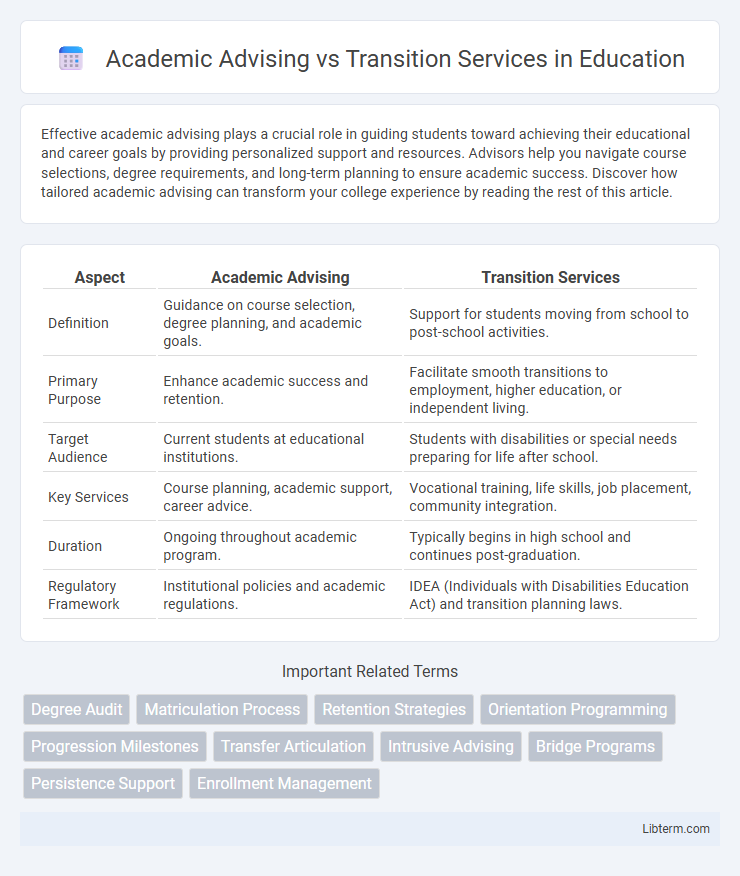Effective academic advising plays a crucial role in guiding students toward achieving their educational and career goals by providing personalized support and resources. Advisors help you navigate course selections, degree requirements, and long-term planning to ensure academic success. Discover how tailored academic advising can transform your college experience by reading the rest of this article.
Table of Comparison
| Aspect | Academic Advising | Transition Services |
|---|---|---|
| Definition | Guidance on course selection, degree planning, and academic goals. | Support for students moving from school to post-school activities. |
| Primary Purpose | Enhance academic success and retention. | Facilitate smooth transitions to employment, higher education, or independent living. |
| Target Audience | Current students at educational institutions. | Students with disabilities or special needs preparing for life after school. |
| Key Services | Course planning, academic support, career advice. | Vocational training, life skills, job placement, community integration. |
| Duration | Ongoing throughout academic program. | Typically begins in high school and continues post-graduation. |
| Regulatory Framework | Institutional policies and academic regulations. | IDEA (Individuals with Disabilities Education Act) and transition planning laws. |
Understanding Academic Advising
Academic advising involves guiding students through course selection, degree requirements, and academic policies to ensure successful progress toward graduation. It emphasizes personalized support, goal setting, and connecting students with campus resources to enhance their educational experience. Effective academic advising fosters student retention and academic performance by addressing individual challenges and promoting informed decision-making.
What Are Transition Services?
Transition services refer to a coordinated set of activities designed to prepare students with disabilities for life after high school, encompassing education, employment, and independent living. These services include skill development in areas such as vocational training, social skills, and self-advocacy, facilitating a smoother shift from academic environments to community and work settings. Unlike academic advising, which primarily focuses on course selection and educational pathways, transition services provide comprehensive support tailored to long-term goals beyond traditional academics.
Key Goals of Academic Advising
Academic advising aims to support student success by providing personalized guidance on course selection, degree requirements, and academic policies, ensuring timely graduation and retention. It focuses on fostering academic achievement, helping students develop educational plans aligned with their career goals, and connecting them to campus resources. Effective academic advising enhances decision-making skills and promotes student engagement throughout their academic journey.
Primary Objectives of Transition Services
Transition services primarily aim to support students with disabilities in moving successfully from school to post-school activities, including higher education, employment, and independent living. These services focus on developing individualized plans that address academic, social, and vocational skills necessary for adult life. Unlike academic advising, which centers on course selection and academic pathways, transition services emphasize coordinated, multidisciplinary support to ensure long-term functional outcomes.
Differences in Target Populations
Academic advising primarily supports high school and college students by guiding course selection, academic planning, and career exploration to enhance educational outcomes. Transition services focus mainly on students with disabilities, often in high school, preparing them for post-secondary education, employment, and independent living through individualized supports. The key difference lies in the target populations: academic advising serves all enrolled students, while transition services cater to individuals requiring specialized assistance during the move from school to adulthood.
Comparing Support Strategies
Academic advising primarily focuses on guiding students through course selection, educational planning, and achieving academic goals, utilizing personalized counseling and progress monitoring. Transition services emphasize preparing students for post-secondary life, including vocational training, independent living skills, and employment readiness, often involving interagency collaboration and community resources. Both support strategies aim to enhance student success but differ in scope, with academic advising centered on educational pathways and transition services targeting holistic life skills and long-term autonomy.
Roles of Advisors vs Transition Coordinators
Academic advisors primarily focus on guiding students through course selection, degree requirements, and academic planning to ensure timely graduation and academic success. Transition coordinators specialize in facilitating students' shift from high school to post-secondary education or employment by coordinating resources, developing transition plans, and connecting families with community services. Advisors emphasize curriculum and academic progress, whereas transition coordinators address broader life skills, independence, and support systems essential for students with disabilities or special needs.
Common Challenges in Service Delivery
Academic advising and transition services often face common challenges such as inconsistent communication between students and advisors, limited resource availability, and difficulty in addressing diverse student needs. Both services struggle with maintaining personalized support while managing high caseloads, leading to potential gaps in student engagement and follow-through. Ensuring seamless collaboration across departments remains critical to overcoming these barriers and improving service delivery outcomes.
Impact on Student Success
Academic advising provides personalized guidance tailored to students' educational goals, enhancing course selection and degree completion rates, which directly improves academic performance and retention. Transition services focus on supporting students during critical change periods, such as moving from high school to college or re-entering the academic environment, thereby reducing dropout rates and fostering resilience. Both services are crucial for student success, with academic advising optimizing ongoing academic progress and transition services addressing adjustment challenges that impact persistence and achievement.
Integrating Academic Advising and Transition Services
Integrating academic advising and transition services enhances student success by providing continuous support from enrollment through post-graduation pathways, aligning educational goals with career planning. This approach involves collaboration between advisors and transition specialists to develop personalized plans that address academic progress, skill development, and employment readiness. Institutions implementing integrated models report improved retention rates, smoother transitions to the workforce or further education, and higher student satisfaction.
Academic Advising Infographic

 libterm.com
libterm.com